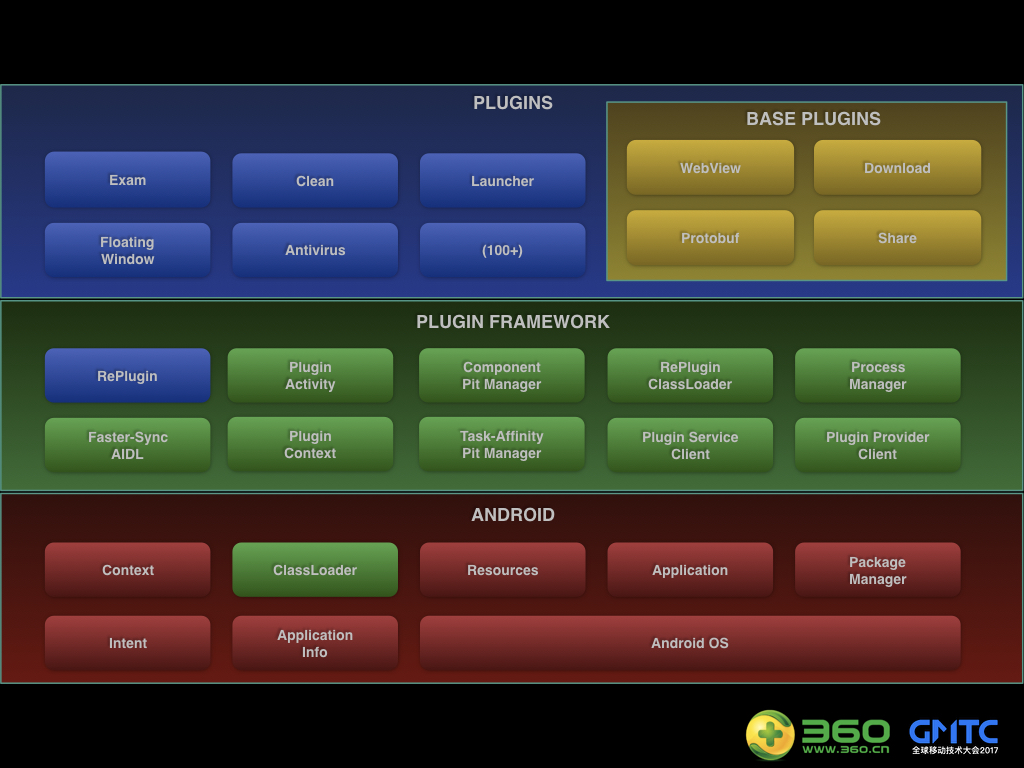Top Related Projects
A powerful Android Dynamic Component Framework.
A small framework to split app into small parts
A powerful and lightweight plugin framework for Android
Android Signature V2 Scheme签名下的新一代渠道包打包神器
Solution to implement multi apk dynamic loading and hot fixing for Android App. (实现Android App多apk插件化和动态加载,支持资源分包和热修复)
demos to help understand plugin framwork
Quick Overview
RePlugin is an open-source Android plugin framework developed by Qihoo 360. It allows for flexible and efficient dynamic loading of components and modules in Android applications, enabling hot-swapping of code and resources without requiring app restarts or updates through app stores.
Pros
- Highly stable and compatible, supporting Android 4.0 to 10.0 and most devices
- Non-invasive design, allowing for easy integration into existing projects
- Supports dynamic loading of both plugins and resources
- Provides a high degree of isolation between host app and plugins
Cons
- Limited documentation in English, which may pose challenges for non-Chinese speakers
- Potential performance overhead due to dynamic loading and inter-process communication
- Complexity in managing multiple plugins and their lifecycles
- May require additional security considerations when loading external code
Code Examples
- Initializing RePlugin in the host application:
public class MyApplication extends Application {
@Override
public void onCreate() {
super.onCreate();
RePlugin.App.onCreate();
}
@Override
protected void attachBaseContext(Context base) {
super.attachBaseContext(base);
RePlugin.App.attachBaseContext(this);
}
}
- Loading and starting a plugin activity:
RePlugin.startActivity(context, RePlugin.createIntent("PluginName", "com.example.PluginActivity"));
- Invoking a plugin method:
PluginProviderClient client = RePlugin.getPluginProvider("PluginName");
Bundle bundle = client.call("MethodName", "param1", "param2");
- Registering a plugin:
RePlugin.registerHookingClass("PluginName", PluginHookImpl.class);
Getting Started
- Add RePlugin to your project's
build.gradle:
dependencies {
implementation 'com.qihoo360.replugin:replugin-host-lib:2.3.3'
}
- Configure RePlugin in your
AndroidManifest.xml:
<application
android:name=".MyApplication"
android:label="@string/app_name">
<!-- RePlugin Activities -->
<activity android:name="com.qihoo360.replugin.sdk.RePluginActivity" />
<activity android:name="com.qihoo360.replugin.sdk.RePluginFragmentActivity" />
</application>
-
Initialize RePlugin in your Application class as shown in the code examples above.
-
Create and load plugins following the RePlugin documentation and examples.
Competitor Comparisons
A powerful Android Dynamic Component Framework.
Pros of Atlas
- More comprehensive documentation and examples
- Better support for multi-language development (Java and Kotlin)
- Tighter integration with Gradle build system
Cons of Atlas
- Steeper learning curve due to more complex architecture
- Less flexible plugin management compared to RePlugin
- Potentially higher overhead for smaller projects
Code Comparison
Atlas:
@AtlasBundle(coverageRate = 0.8f)
public class BundleApplication extends Application {
@Override
public void onCreate() {
super.onCreate();
// Bundle-specific initialization
}
}
RePlugin:
public class PluginApplication extends Application {
@Override
public void onCreate() {
super.onCreate();
RePlugin.App.onCreate();
// Plugin-specific initialization
}
}
Both Atlas and RePlugin are Android dynamic component frameworks, but they differ in their approach and implementation. Atlas focuses on modularization and build-time optimization, while RePlugin emphasizes runtime flexibility and ease of use.
Atlas provides a more integrated solution with the build system, making it suitable for large-scale projects with complex module dependencies. RePlugin, on the other hand, offers a simpler plugin system that can be easier to adopt for existing projects.
The code comparison shows that Atlas uses annotations to define bundles, while RePlugin relies on a more traditional plugin initialization approach. This reflects the different philosophies of the two frameworks in terms of how they manage and load dynamic components.
A small framework to split app into small parts
Pros of Small
- Lighter weight and more flexible architecture
- Easier integration with existing projects
- Better support for incremental updates
Cons of Small
- Less comprehensive documentation
- Smaller community and fewer third-party plugins
- May require more manual configuration
Code Comparison
Small:
Small.setBaseUri("https://example.com/updates/");
Small.setUp(this);
Small.openUri("main", this);
RePlugin:
RePlugin.App.onCreate();
RePlugin.install("plugin.apk");
RePlugin.startActivity(MainActivity.this,
RePlugin.createIntent("plugin.apk", "com.example.PluginActivity"));
Both projects aim to provide plugin frameworks for Android applications, but they differ in their approach and implementation. Small focuses on a lightweight and flexible solution, making it easier to integrate into existing projects. RePlugin, developed by Qihoo360, offers a more robust and feature-rich framework with extensive documentation and community support.
Small's architecture allows for easier incremental updates and a more modular approach to plugin management. However, it may require more manual configuration and has less comprehensive documentation compared to RePlugin.
RePlugin provides a more complete ecosystem with better documentation and a larger community, but it may be more challenging to integrate into existing projects due to its more opinionated architecture.
A powerful and lightweight plugin framework for Android
Pros of VirtualAPK
- Lighter weight and more flexible plugin system
- Supports dynamic loading of resources and code without app restart
- Better integration with Android Studio for plugin development
Cons of VirtualAPK
- Less mature and potentially less stable than RePlugin
- Smaller community and fewer updates compared to RePlugin
- May require more manual configuration for complex plugin scenarios
Code Comparison
VirtualAPK plugin initialization:
PluginManager pluginManager = PluginManager.getInstance(context);
pluginManager.init();
String pluginPath = Environment.getExternalStorageDirectory().getAbsolutePath() + "/plugin.apk";
pluginManager.loadPlugin(pluginPath);
RePlugin plugin initialization:
RePlugin.App.attachBaseContext(this);
RePlugin.App.onCreate();
RePlugin.install("plugin.apk");
RePlugin.startActivity(context, RePlugin.createIntent("plugin.apk", "com.example.PluginActivity"));
Both VirtualAPK and RePlugin are Android plugin frameworks that allow for dynamic loading of components and resources. VirtualAPK offers a more lightweight approach with easier integration into existing projects, while RePlugin provides a more robust and mature ecosystem with potentially better stability for large-scale applications. The choice between the two depends on specific project requirements, desired flexibility, and the level of community support needed.
Android Signature V2 Scheme签名下的新一代渠道包打包神器
Pros of walle
- Simpler and more lightweight solution for Android app packaging and channel distribution
- Focuses specifically on channel packaging, making it easier to use for this purpose
- Supports a wider range of channel packaging strategies, including custom channel information
Cons of walle
- Limited to channel packaging and doesn't provide a full plugin framework like RePlugin
- May require additional tools or plugins for more complex app distribution scenarios
- Less active community and fewer updates compared to RePlugin
Code Comparison
walle:
ChannelWriter.put(new File(apkPath), channelName, extraInfo);
RePlugin:
RePlugin.registerHookingClass("com.qihoo360.replugin.sample.demo1.MainActivity",
MainActivity.class, null);
RePlugin.startActivity(context, RePlugin.createIntent("demo1", "com.qihoo360.replugin.sample.demo1.MainActivity"));
While walle focuses on simplifying channel packaging with a single method call, RePlugin provides a more comprehensive plugin framework with methods for registering and starting plugin activities.
Solution to implement multi apk dynamic loading and hot fixing for Android App. (实现Android App多apk插件化和动态加载,支持资源分包和�热修复)
Pros of DynamicAPK
- Lightweight and simple implementation
- Focuses specifically on dynamic loading of APK files
- Easier to integrate into existing projects due to its simplicity
Cons of DynamicAPK
- Less comprehensive feature set compared to RePlugin
- Limited documentation and community support
- Fewer options for customization and advanced use cases
Code Comparison
RePlugin:
RePlugin.install("plugin.apk");
RePlugin.startActivity(context, RePlugin.createIntent("plugin", "com.example.PluginActivity"));
DynamicAPK:
DLPluginManager.getInstance(this).loadApk(apkPath);
DLPluginManager.getInstance(this).startPluginActivity(this, new DLIntent(packageName, activityName));
Both frameworks provide similar functionality for loading and starting plugin activities, but RePlugin offers a more streamlined API. RePlugin's approach is more intuitive and requires less boilerplate code. DynamicAPK's implementation, while functional, is slightly more verbose and may require additional setup.
RePlugin generally offers more features and flexibility, making it suitable for complex projects. DynamicAPK, on the other hand, is simpler and may be preferable for smaller projects or those requiring basic dynamic loading functionality.
demos to help understand plugin framwork
Pros of understand-plugin-framework
- More educational focus, providing detailed explanations of plugin framework concepts
- Simpler implementation, making it easier for beginners to understand
- Includes examples of different plugin loading techniques
Cons of understand-plugin-framework
- Less feature-rich compared to RePlugin
- Not as production-ready or optimized for large-scale applications
- Limited documentation and community support
Code Comparison
understand-plugin-framework:
public class PluginClassLoader extends ClassLoader {
private final String mDexPath;
public PluginClassLoader(String dexPath, ClassLoader parent) {
super(parent);
mDexPath = dexPath;
}
}
RePlugin:
public class PluginClassLoader extends DexClassLoader {
private final String mPluginName;
private final PluginCommImpl mPluginManager;
public PluginClassLoader(String dexPath, String optimizedDirectory, String librarySearchPath, ClassLoader parent, String pluginName, PluginCommImpl pm) {
super(dexPath, optimizedDirectory, librarySearchPath, parent);
mPluginName = pluginName;
mPluginManager = pm;
}
}
The code comparison shows that RePlugin's PluginClassLoader is more complex, with additional parameters and functionality, while understand-plugin-framework's implementation is simpler and more focused on demonstrating the basic concept.
Convert  designs to code with AI
designs to code with AI

Introducing Visual Copilot: A new AI model to turn Figma designs to high quality code using your components.
Try Visual CopilotREADME
ï¼ï¼ï¼éè¦éç¥ï¼ï¼ï¼
ç±äºjcenteråæåå ï¼RePluginå°è¿ç§»å°http://maven.geelib.360.cn/nexusä¸
å¦æéè¦ç»§ç»æ¥å ¥RePluginï¼éè¦å¨é¡¹ç®çbuild.gradleå å¢å æ°çä»åºå°å:
maven {url "http://maven.geelib.360.cn/nexus/repository/replugin/"}
éç¥
360å¼æºåä¸åä½ââArgusAPM移å¨æ§è½çæ§å¹³å°
ArgusAPMæ¯360ææºå«å£«å®¢æ·ç«¯å¢é继RePluginä¹åå¼æºçåä¸ä¸ªéé级å¼æºé¡¹ç®ãArgusAPMæ¯360移å¨ç«¯äº§å使ç¨çå¯è§åæ§è½çæ§å¹³å°ï¼ä¸ºç§»å¨ç«¯APPæä¾æ§è½çæ§ä¸ç®¡çï¼å¯ä»¥è¿ éåç°åå®ä½åç±»APPæ§è½å使ç¨é®é¢ï¼å¸®å©APPä¸æçæåç¨æ·ä½éªã
360移å¨ææ¯ææ°æ´»å¨éç¥ï¼
2018å¹´12æ16æ¥ï¼360移å¨æ§è½å¼æ¾æ¥éæ¨åå ï¼å±æ¶å°ä¼æ360ãç¾å¢ææ¯å¤§ç为大家å享AndroidãiOSæ§è½çæ§å®è·µã 欢è¿æ¥ååå ï¼æ³æ³æ³!!!-->https://mp.weixin.qq.com/s/-7DCnXI_EBMBwYG_PUuUDg
RePlugin ââ A flexible, stable, easy-to-use Android Plug-in Framework
RePlugin is a complete Android plug-in solution which is suitable for general use.
ï¼ææ¡£ï¼è¿æ¯ä¸æç好ï¼
It is major strengths are:
- Extreme flexibility: Apps do not need to be upgraded to support new components, even brand new plug-ins.
- Extraordinary stability: With only ONE hook (ClassLoader), NO BINDER HOOK. RePluginâs Crash ratio is as low as Ten thousandth (0.01%). In addition, RePlugin is compatible with almost ALL Android ROMs in the market.
- Rich features: RePlugin supports almost all features seamlessly as an installed application, including static Receiver, Task-Affinity, user-defined Theme, AppCompat, DataBinding, etc.
- Easy integration: It takes only couple lines to access, whether plug-ins or main programs.
- Mature management:ãRePlugin owns stable plug-in management solution which supports installation, upgrade, uninstallation and version management. Process communication, protocol versions and security check are also included.
- Hundreds of millions support: RePlugin possesses hundreds of millions users from 360 MobileSafe. After more than three-year verification, we guarantee the solution that Apps use is the most stable and suitable.
By the end of June 2017, RePlugin has already made some achievements:
| Feature | Achievement |
|---|---|
| Plug-in Number | 103 |
| Ratio of plug-ins to applications | 83% |
| Version released pre year | 596 |
| Crash | 0.01%, Extraordinary stability |
| First Release | 2014 |
At present, almost all Apps with hundreds of millions users from 360, and many mainstream third-party Apps, are using RePlugin solution.
We support:
| Feature | Description |
|---|---|
| Components | Activity, Service, Provider, Receiver(Including static) |
| Not need to upgrade when brand a new Plug-in | Supported |
| Android Feature | Supported almost all features |
| TaskAffinity & Multi-Process | Perfect supported! |
| Support Plug-in Type | Built-in (Only Two Step) and External(Download) |
| Plug-in Coupling | Binder, Class Loader, Resources, etc. |
| Interprocess communication | Sync, Async, Binder and Cross-plug-in broadcast |
| User-Defined Theme & AppComat | Supported |
| DataBinding | Supported |
| Safety check when installed | Supported |
| Resources Solution | Independent Resources + Context pass(No Adaptation ROM) |
| Android Version | API Level 9 (Android 2.3 and above) |
Our Vision
Make RePlugin be used in all kinds of ordinary Apps; and provide stable, flexible, liberal plug-ins which adopt for both large and small projects.
Latest features
Solved the Android P (Android 9.0) related adaptation issues, fully support the official version of Android P (Android 9.0).
RePlugin Architecture
How to Use RePlugin
Using RePlugin is very simple. Under most conditions, using it is no different than developing an App.
If you are the first-time user, please click here to read Quick Start Guide(Chinese Version). Following our guide, you will learn more about RePlugin.
If you wish to learn more gameplays about RePlugin, please click here to read Step-by-step Tutorial(Chinese Version).
If you want to view RePluginâs sample project, and learn concrete usage of the frame, please click here to check Sample SC.
If you have any question, please click here to read FAQ(Chinese Version).
These apps are using RePlugin
 |
 |
 |
 |
 |
| 360 Mobile Safe | 360 App Store | 360 Mobile Browser | HuaJiao Camera | 360 Clean Master |
 |
 |
 |
 |
 |
| 360 Kan Movie | JieQianBa | 1 HaiTao | HuaRun Tong | JieLeMa |
 |
 |
 |
 |
 |
| 360OS App | 360 Loan | (Internal App) | (Internal App) | (Internal App) |
Plug-ins Accessed in RePlugin
For your reference, plug-ins accessed can be classified into following categories:
- Expo plug-ins: Safe Home Page, physical examination, information flow, etc.
- Business plug-ins: cleaning, disturbance intercept, floating window, etc.
- Cooperation plug-ins: App Lock, free Wi-Fi, security desktop, etc.
- Background plug-ins: Push, service management, Protobuf, etc.
- Base plug-ins: Security WebView, share, location service, etc.
By the end of June 2017, we already have 102 plug-ins like these. We look forward to you becoming a part of RePlugin family!
Contribute Your Share
We sincerely welcome and appreciate your contribution of any kind. You can submit code, raise suggestions, write documentation, etc. For more information, please click here to read Contribute Your Share(Chinese Version).
License
RePlugin is Apache v2.0 licensed.
(Thanks Xiezihanï¼è°¢åæï¼ for providing the translations.)
Top Related Projects
A powerful Android Dynamic Component Framework.
A small framework to split app into small parts
A powerful and lightweight plugin framework for Android
Android Signature V2 Scheme签名下的新一�代渠道包打包神器
Solution to implement multi apk dynamic loading and hot fixing for Android App. (实现Android App多apk插件化和动态加载,支持资源分包和热修复)
demos to help understand plugin framwork
Convert  designs to code with AI
designs to code with AI

Introducing Visual Copilot: A new AI model to turn Figma designs to high quality code using your components.
Try Visual Copilot


